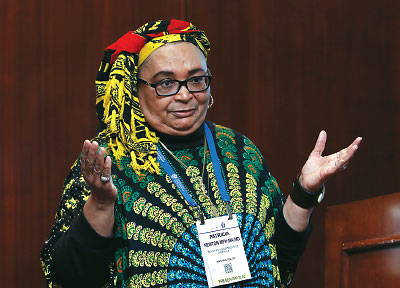Patricia Newton, Advocate for Black Psychiatry, Dies
Abstract
Patricia A. Newton, M.D., M.P.H., M.A., was CEO and medical director and a past president and founding member of the Black Psychiatrists of America.

Patricia A. Newton, M.D., M.P.H., M.A., was renowned for her pioneering work integrating African spirituality into Black mental health.
Patricia A. Newton, M.D., M.P.H., M.A., the CEO and medical director and a past president and founding member of the Black Psychiatrists of America (BPA), died in September. Newton, age 74, was a celebrated advocate for Black psychiatrists and patients and served on the organization’s Council of Elders. Newton was one of the first APA/NIMH Fellows and the first woman chair of the Department of Psychiatry at Provident Hospital in Baltimore. Her clinical work centered on anxiety disorders with a special focus on posttraumatic stress disorder, as well as depression and chronic mental illness.
Newton was renowned for her pioneering work integrating African spirituality into Black mental health and for working with health care professionals in Africa and the Caribbean as well as in the United States. In Ghana, where she was known as Nana Dr. Akosua Akyaa, she was enstooled as a queen mother and a female king, which made her an Ashanti Royal.
“She was a renaissance mental health professional in many respects,” past APA President Altha Stewart, M.D., told Psychiatric News. “She was traditionally trained and had two arms’ lengths of credentials, but she also brought to her work a wealth of specific knowledge of the mental health of people of African descent across the globe. We have lost a major force in furthering the work we have to do.”
Stewart noted Newton’s love of travel and the trips Newton led as an international tour operator.
“She knew the history of the places where she took people. There was a vastness to her experience that is unparalleled,” Stewart said.
Danielle Hairston, M.D., president of the APA Caucus of Black Psychiatrists and the psychiatry residency training director at Howard University College of Medicine, recalled Newton as a cherished mentor.
“Even before there were key terms like ‘intergenerational trauma,’ she understood the mental health needs that come from a history of oppression that still affects Black people and Black families today. She transformed the way I felt about psychiatry,” Hairston said.
“Authenticity is what she portrayed, and that’s what I try to embody,” Hairston added. “I’m always going to be dedicated to decreasing stigma and preserving the mental health of the Black community, which is so vulnerable and has been so marginalized, but no way would I have had the courage to speak out about the trauma Black people face if she hadn’t been in my life.”
Samuel O. Okpaku, M.D., Ph.D., immediate past president of the BPA, reflected on Newton’s work and how she sought to provide both strength and hope for Black early career psychiatrists. “She was astute in terms of racial injustice, but she did not have rancor. She spoke from fairness and integrity, and she had no bitterness.”
Among the many awards Newton received were the BPA’s Isaac Slaughter, M.D. Memorial Award for Outstanding Leadership and the Lloyd Elam, M.D. Memorial Award for Lifetime Achievement. She was Essence Magazine’s Woman of the Year in Health and Medicine and one of Baltimore Magazine’s 100 Most Influential Women in Baltimore. In 2018 she received APA’s Solomon Carter Fuller Award, named for the first Black psychiatrist in America, which honors a Black citizen whose pioneering work has significantly improved the quality of life for Black people.
“Dr. Newton was a dauntless advocate for Black psychiatrists and Black patients,” said APA CEO and Medical Director Saul Levin, M.D., M.P.A. “With her dedication to addressing the societal wrongs of racism and discrimination, her passion for healing the deep traumas of history, and her vast work in the international arena, she forged a legacy that stands as inspiration for all of us.” ■



